How Nicolai Wiedmer embodies German hospitality
Riesling and Currywurst – sometimes you think that’s all people know about German gastronomy. Although German wines made headlines over the last decades, the development of German cuisine may have unfolded somewhat more outside the limelight. But what is German cuisine? Germany’s Wirtshaus tradition may be the key to understanding it. Chef Nicolai Wiedmer owns a modern Wirtshaus and a restaurant with gehobene Küche in a former Wirtshaus in the southwestern corner of the state of Baden, arguably the birthplace of German cuisine.
An exploration of German haute cuisine is bound to start in the state of Baden. For some Alfred Walterspiel, born in Baden in 1881, is the founder of modern German cooking. As is common to this day, his career started with a string of stations in luxury restaurants across Europe. He eventually opened his own restaurant Walterspiel in München in 1926. It became one of Germany’s prime dining destinations where his gastronomic wizardry earned him the nickname the German Escoffier. Walterspiel was among the first restaurants that were awarded a star, when Michelin reintroduced its guide in Germany in the mid-1960s. By that time Alfred had passed away, but his sons had continued the business.
Shopping in Strasbourg
Baden is Germany’s culinary cradle, but not just because Walterspiel was born here. As Michelin says, fresh, high-quality produce was hard to get in Germany at the time, but the Badeners could go shopping at the markets in Strasbourg. Although temples of gastronomy are now scattered all over the country, the density is still high in Baden, and small Baiersbronn, with, until recently, two three-star restaurants is its Holy of Holies. (The Schwarzwaldstube, where Harald Wohlfahrt held sway for many years, was destroyed by fire in 2020. Many of Germany’s current top chefs have trained with Wohlfahrt.)
Wirtshaus
Although German haute cuisine is hard to pinpoint, the country does have a strong tradition rooted in its regional, middle class home-style cooking or, in German, its gutbürgerliche Küche. Rustic dishes like Sauerkraut, Spätzle, Sauerbraten and Sausage were (and are) the staples from which many chefs still draw inspiration. Nicolai Wiedmer is one of them. He runs two restaurants in Germany’s southwesternmost corner: Eckert is his starred flagship in Grenzach-Wyhlen, Mättle is a modern Wirtshaus in nearby Lörrach. “A Wirtshaus is more than a restaurant,” Wiedmer explains. “It is a meeting place (Treffpunkt), where you come with your friends or family for a casual one-plate dinner or for a festive four-course menu with a good glass of wine. It has to offer good quality with an excellent price-quality ratio to make it accessible for as many people as possible.”
© Restaurant Eckert
Working with legends
Wiedmer (28) – stocky build, slightly corpulent, blond tuft of hair on a boyish face – went to culinary school in Basel, where he spent part of his time at school and apprenticed for the other part with Tanja Grandits at her famous restaurant Stucki. He outshone all his classmates and to this day Grandits is his mentor, friend and role model. Grandits took him along to several international culinary events providing him with the opportunity to meet and work with legends like Harald Wohlfahrt (who perfected Wiedmer’s fish cooking skills). It also taught him how to cook efficiently for large groups.
All of life
Although there is a red thread of German dishes running through the menu, both at Mättle and Eckert, the source of inspiration he mentions first is Asia. And indeed, miso, ginger, lemongrass and yuzu embellish traditional German dishes like fillet of veal, trout or beef tartar. But, Wiedmer says, “the menu at Eckert changes every season, and so do my sources of inspiration.” So, what is it that stimulates Wiedmer’s creativity? The list is long: a hike, a glass of wine, a conversation, other restaurants, travel, friends, architecture, … “As a matter of fact, all of life.” Atlanta Lehmann, his newly appointmed sommelier puts it as follows: “Wiedmer likes the spotlight, but he doesn’t need to be everybody’s friend. He likes bold flavours, especially acidity and a bit of spice. His gut feeling is spot-on and he trusts it.”
Mutual sympathy
Wiedmer’s Wirtshaus mentality shines through in his desire to not only be a cook, but also a host (Gastgeber). He likes to welcome the guests, bid them farewell, and entertain them while serving a dish. Atmosphere is paramount. When he recruits new staff, he is less interested in a long resume with many impressive stations, but rather values a sense of humor, a friendly smile and a good rapport with guests and colleagues. Lehmann confirms: “During my interview, we noticed our tastes aligned, but more importantly, we immediately felt mutual sympathy.” When I suggest this is probably more important for the service brigade than the chefs, Wiedmer denies it. “A harmonious team in the kitchen that has fun working long hours under sometimes stressful conditions is essential for the success of a restaurant.” He praises his head chef Andreas Berger for nurturing a great team spirit.
German hygge
“I want to make memories,” Wiedmer says. “A good dish is obviously essential, but it is also atmosphere.” That is why he also pays detailed attention to the design of his restaurants. At Eckert he worked with the iconic furniture company Vitra (based in the same area), while maintaining original details, like the orange wooden bar with an antique cash register, of the old Wirtshaus he and his father acquired in 2014. At Mättle he hired interior designer Sebastian Herkner to create the “hardware” for Gemütlichkeit, the German rendition of hygge.
Eckert, former Wirtshaus © Restaurant Eckert
No impositions on the guests
When the pandemic is over and restaurants are allowed to reopen, Wiedmer intends to spend more time in the kitchen again. He is young and clearly has higher ambitions. “I don’t necessarily strive for a second Michelin star, but I do want to further refine my cooking.” However, his friend Jeroen Achtien, chef at restaurant Sens at the Vitznauerhof in Switzerland, just received his second star, so the heat is on. When I confront him with some criticism on the pacing, he admits that there is room for improvement. However, he says, “We prefer not to work with time slots. We don’t want to impose anything upon our guests; they should be able to make a reservation for the time that suits them best. Moreover, Eckert is a fine-dining restaurant, but with an open door for locals, who may have a starter and a main only.” Wirtshaus concept in action! It does indeed sometimes complicate a smooth pacing of the dishes, but Wiedmer and his young team are keen to improve it as soon as things get back to normal.
Daring pairing
Recently, the wine menu is undergoing improvement too. Atlanta Lehmann, who, among other things, did a harvest at Weingut Schätzel and worked the wine bottles at restaurant After Seven in Zermatt, is expanding the list to 500 positions with more room for alternative styles. A skin-fermented Grüner Veltliner made in amphorae from Dorli Muhr (Austria) and an oxidatively aged Silvaner from Horst Sauer (Franken), to name just two, are now proudly sharing the pages with classic wines from France, Spain and Italy. “We have to take it slowly though,” Lehmann says. “We are a restaurant in a predominantly rural, provincial environment where you need to take guests by the hand on their vinous discovery tour. This isn’t Berlin, Copenhagen or London. We now typically have two natural wines in our wine pairing of six or seven glasses, but our combinations can be quite daring.” Indeed, they are. What to think of a Bourgogne Rouge from Domaine Trapet paired with a lobster bisque? “Ingredients like seabuckthorn and pumpkin make it work. The response is mostly very positive,” Lehmann says beaming. Meanwhile Eckert keeps on championing wines from Baden.
Lobster © Restaurant Eckert
Which brings us back to the cradle of German gastronomy.
Witzigmann
Despite Walterspiel’s efforts, it took a while before fine dining became acceptable again after the Second World War. It was considered to be too extravagant during the years of reconstruction. The real breakthrough came in 1978, when restaurant Aubergine in Münich became the first German restaurant to be awarded three Michelin stars. Its chef Eckart Witzigmann is credited with introducing Nouvelle Cuisine to Germany. The name Aubergine apparently refers to the fruit and the French word auberge, as in Auberge de l’Ill, the renowned Alsatian restaurant where Witzigmann, an Austrian, did a stint. (As a twist of fate, it was a German chef with the name of Juan Amador who became the first to receive the highest culinary accolade in Austria in 2019, much to the chagrin of the Austrians, who thought their fellow countryman Heinz Reitbauer should have been given the honour.)
Subtle Germanity
From here on, German haute cuisine became ever more widespread and varied. While there are now distinctly innovative, Scandinavian-inclined places like Nobelhart & Schmutzig too, most of the top addresses are thoroughly classically French based and internationally twisted, but always with German roots. Wiedmer praises Sascha Stemberg’s restaurant in the Ruhr area for elevating the German classics dishes, like ox cheeks and Blutwurst (black pudding) to Michelin star level (besides serving a more international menu).
Wiedmer’s “Germanity” is subtler and his cuisine more international, but, as Atlanta Lehmann says: “His head may be in the clouds, but his feet are firmly on the Badischer ground.” It’s not only his cuisine that makes him an epitome of German cuisine, it’s also his sense of hospitality, or Gastgeberschaft that roots in the tradition of Germany’s Wirtshäuser.
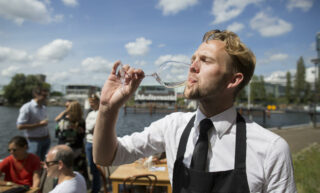
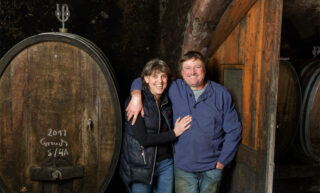
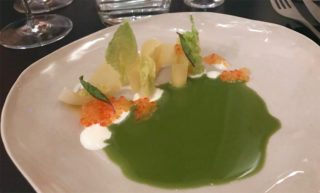
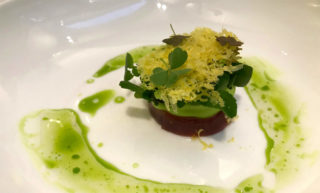
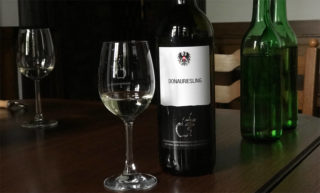
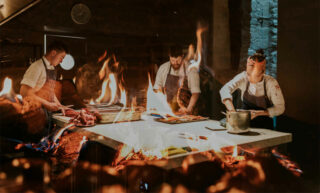
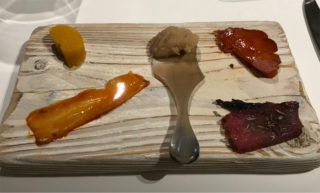
Comments